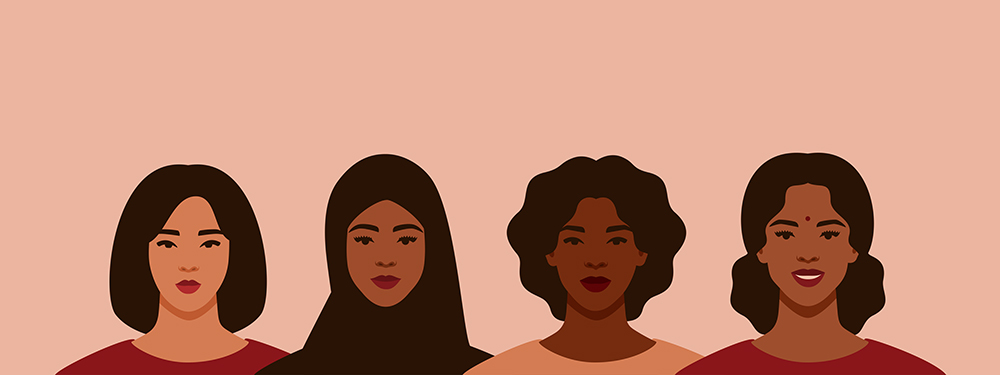The views expressed here are my own and do not reflect those of my employer or any other organization I am associated with.
When I first landed in the US in 2015, as a young law school student, I immediately noticed a scarcity of folks that look like me not just around me in the law school, but also in leadership positions inside and outside the University as a whole. I noticed that people were fascinated by my accent and used words like “exotic cuisine” and “ethnic” in relation to me. Till this day, I have still got to find at least one non-south asian who said my name right even after multiple tries. Soon I became a member of the board of Directors of Madison Community Coop and as the VP of the Middle Eastern Law Students Association, I still happened to be the only south asian in those spaces as well. Fast forward to today, I am still “the only” or “the first” in a lot of spaces not just at my workplace but also at WORT radio station and in political and activist circles in and around Dane County. I am telling you all this because I want to make a point which is, even when we South Asians and our fellow AAPI family form nearly 120,000 eligible voters in Wisconsin, why is it that a South Asian woman who cannot not only vote but also not run for elections, has to be so many firsts and onlys? Why is it that Wisconsin has still yet to see a South Asian state assembly representative? This is not the year not 2000 or even 2010, but 2022. Why is it that we have never had any South Asian as a Governor or a Lt Gov? Why is it that we have never elected a South Asian as a US Senator when our neighboring state Illinois and the great state of California have already alongside others?
One thing is clear: It is not because of the lack of eligible South Asians, but our lack of understanding that representation holds power. When we see people like us in positions of power, we feel more included in the system. We feel more like decision makers versus “people who have to follow the law or else.” Representation gives us a seat at the table instead of being on the menu. And that is a powerful tool to not just include, but to also empower people so much that they come out and show up for the right cause when it’s time. After all, what hope of change does one hold when even after nearly 200 years of Wisconsin’s existence, the second most populous country on earth, India, along with its neighboring countries still has to fight for representation at each and every level? And if there is going to be no change, there is going to be a number of us South Asians who would not show up. Or would show up for the wrong side because losing faith in the political system is a real thing. Lets not forget that Florida used to be blue until the Latinos started voting Republican. The moral of the story is, we need to empower and organize around South Asian candidates and leaders. We need to be equitable with our resources and not preach equality. There is no equality without equity. And it all boils down to “ if you don’t trust me with power, why should I cast my vote for you and trust you with it?”
Another challenge I have noticed is the relevance of racial binary. Americans as a whole think that race is Black and White and everything in between. A Nigerian Irish scholar Emma Dabiri expressed that the same system that destroys our environment and participates in oppressive capitalist ideologies all around the world, is the same system that dictates a racial binary. I believe this binary defaults to the white experience and treats that as a yardstick to measure marginalization. It pits people of color against each other. This is the same system that treats us Asians as a “model minority.” In electoral politics this ends up being a BIG factor that hampers not only Asian representation, but also Asian-focussed advocacy and organizing tactics around the Asian vote. As an organizer with and a former campaign manager for two AAPI candidates, I have spent a lot of time organizing with Asians in Wisconsin. One thing I unfortunately noticed was the lack of attention our communities get when the time is ripe not just for candidates campaigning, but also when it comes to political parties and their outreach to our communities. We are Hindus, Muslims, Christians, Jewish, Parsis, Jains, Sikhs and Buddhists. We are also citizens and non-citizens like yours truly. We have multiple genders amongst us and people with disabilities. All advocacy efforts that include non-Asians in advocacy in regards to the above mentioned intersections MUST include Asians moving forward. And while we enjoy Asian and Indian food and indulge in Made in China products, we need to secure inclusion efforts and concrete and viable laws protecting not just Asian folks as a whole but also of the diversity that we have within us.
The third challenge that I frequently face is access to language. For example: not many people know this but recently my co-worker whose Hmong brought to our attention that nearly half of eligible Hmong voters in Wisconsin do not understand how the government works because they are not fluent in english. Some Hmong elders do not know English at all. In a world where almost all our electoral literature and outreach efforts are in English and sometimes Spanish, inclusion of the linguistically marginalized Asian folks remains an impediment. For example, as told to me by my Hmong co-worker, so many Hmong folks do not understand what the English word “Governor” means or what the “US Senate” means. What is a culturally parallel word for these terms if any. We need to reach these voters and actively engage in political literacy in their language. We not only need to show through these actions that we care for them but also that we are committed to true inclusion and diversity efforts.
The last and fourth challenge that I face as an organizer is our political infrastructure’s inability to care about our communities long term. What is long term? The fact that we even have to ask this question is an indication of how removed from Asian communities all of us are. I do appreciate what we have done so far including but not limited to passage of the “Stop Asian Hate Act” at the federal level. But let’s be honest, so far most of our efforts have been on-the-surface and cursory. They have been curtain dressing.
We must not forget that while we do have nearly 120,000 eligible Asian voters in Wisconsin, we have an equal number of, if not more, Asian immigrant non-citizens who will be future voters. Working through the challenges I talked about won’t just guarantee that more Asians would begin to vote but would show the future Asian voters that we just don’t talk the talk but also walk the walk. Future voters matter equally and are foundational to creating a long term progressive fabric in Wisconsin. Therefore we must not only create new votes but work hard to keep the existing ones.
























0 Comments